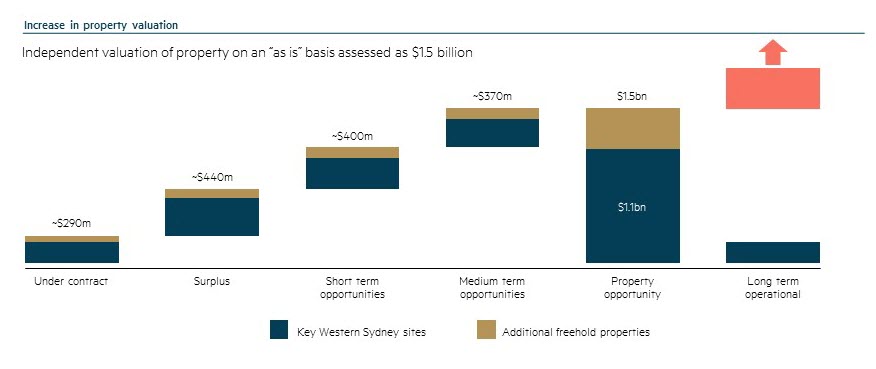Two attractive cyclical stocks with asset-backed upside
Earlier this month we attended investor days for two stocks in completely different industries. They both operate in cyclical industries that are leveraged to the consumer, which is potentially in for a tougher few years ahead as higher interest rates and inflation affect household budgets. What makes these stocks appealing to us as small cap investors are three common themes that we believe position them far better than the market is implying at current share prices:
- large and strategic property holdings which back-fill the majority of the current enterprise valuations
- significant operational enhancements to the business which we believe should protect earnings in a downturn to a far greater extent than in previous down-cycles
- top class management teams.
CSR’s property portfolio provides the sugar on top
CSR Limited (ASX: CSR) is a diversified building products group primarily supplying the residential housing market. CSR has a long and varied history, having started sugar milling operations in 1855, and has been involved in construction, contract mining, glass manufacturing and asbestos mining at various points during its history.
Today the group generates most of its profit from building materials such as bricks, insulation, gyprock and cladding. It also owns a ~25% stake in the Tomago aluminium refinery located near Newcastle, NSW.
It is, in our view, the vast property portfolio CSR possesses through its long history in the building industry that provides the most opportunity.
Old quarries and manufacturing sites are strategically located parcels of land that can be rezoned for residential or industrial use and sold to developers once significant value has been added through rehabilitation and rezoning work. The cashflow generated from these sales supports a generous dividend in addition to an ongoing share buyback.
This property portfolio was independently valued at $1.5 billion at 30 September 2022.[1] Even though rising cap rates are likely to be a headwind to property values over the next few years, we are confident that this $1.5 billion is a very solid estimate for two reasons. First, this is an ‘as is’ valuation, and certain sites can see significant further value unlocked through rehabilitation and rezoning. Second, around 75% of this value is located in Western Sydney, including a majority around the Badgerys Creek airport development, which we believe will see significant infrastructure and industrial development over the coming decade.

Source: CSR FY22 Results Presentation (4/11/22)
At today’s enterprise value of $2.3 billion (after taking into account $180 million of net cash and a $210 million asbestos payment liability), the property value accounts for around two-thirds of the group’s value. This leaves $800 million of value ascribed to the building products portfolio and the Tomago stake. We believe these divisions will generate $372 million of EBITDA in the current financial year, implying a multiple of just 2.2x EBITDA. This compares to peers, which trade on ~4-9x EBITDA[2]. We know that the building products market is near or at a cyclical peak driven by huge demand over the past few years, but even taking a 15-year average of earnings from the building products and Tomago divisions yields an EBITDA multiple of 2.6x, this is well below our view on fair value.
The group has also undertaken a significant manufacturing streamlining process in recent years and has an ongoing supply chain rationalisation process which should take further cost out of the business by 2025. At the investor day, we saw the high level of automation at the Hebel plant in Somersby, which is a well-positioned product for structural growth in future years. This gives us confidence that margins are more likely to hold up better than in previous down cycles in the building market.
The main event
EVT Ltd (ASX: EVT) is a consumer-facing group and owns a large portfolio of cinemas, hotels and the Thredbo resort. COVID lockdowns during 2020 and 2021 caused a lot of pain to the group, which is entirely reliant on consumers leaving their house for experiences, though it did provide a good opportunity to refine the offering and deliver operational improvements.
‘Premiumisation’ across the cinemas and Thredbo business has seen a material lift in average spend per visit, driven by a superior offering to the consumer (for example, better seats and screens in the cinema and fewer lift queues at Thredbo). The hotel division has benefited from higher room rates driven by the boom in domestic tourism and has a few key properties undergoing renovations, which should drive a further uplift on re-opening.
While being a consumer offering, we see less risk in the EVT group compared to other consumer-facing companies such as retailers. Cinemas have a very weak line-up of movies this financial year driven by the lack of production during COVID, which should improve in coming years. While hotel room rates should normalise, there is upside from new hotels being added to the group and the development pipeline. In a recessionary environment, EVT also has a likely offset from lower demand as consumers trade down (high priced restaurants to going to a movie, international to domestic travel).
Like CSR, there is a large property portfolio underlying the business, which EVT estimate is worth ~$2.0 billion. Unlike CSR, there is no surplus land available for sale, and while EVT has some non-core properties they have been selling off, it is extremely unlikely we will see significant land sales. The property valuation exercise is therefore more an indication of underlying value than a likely course we will see the group take.
EVT has an enterprise value of $2.43 billion today – taking off the $2.0 billion property valuation, therefore, implies the operating businesses are worth $430 million. The group delivered an average EBITDA of $245 million in the five years leading up to COVID. We believe there is potential to deliver an EBITDA figure substantially in excess of this in future years given the operational improvements discussed above, but we will use the historic average as a start.
Given the properties are used for cinema and hotel operations, there would be a real rent cost if sold, and assuming a 7.5% cap rate on the $2 billion property, this equates to a rent cost of $150 million.
We, therefore, believe EVT has an operational EBITDA of $95 million, implying a 4.5x EBITDA multiple. Global-listed cinema companies trade on an average of 6x EBITDA, hotel companies on 12.5x, and Vail Resorts (MTN-USA) as the closest competitor for Thredbo trade on 12x.[3] EVT appears cheap compared to all under this exercise.
Solid medium-term small cap holdings
Timing the purchase and sale of cyclical stocks is very difficult, and there are elements of CSR and EVT’s businesses that are likely near a cyclical peak in earnings. We do feel, however, that this is well known by the market and that both CSR and EVT have significant underlying value in their property holdings that the market is not appreciating. Coupled with improvements in the underlying businesses which offer the potential to support earnings in excess of historical cyclical troughs, we believe these are solid medium-term small cap holdings.
Never miss an insight
If you're not an existing Livewire subscriber you can sign up to get free access to investment ideas and strategies from Australia's leading investors.
And you can follow my profile to stay up to date with other wires as they're published – don't forget to give them a “like”.
2 stocks mentioned

